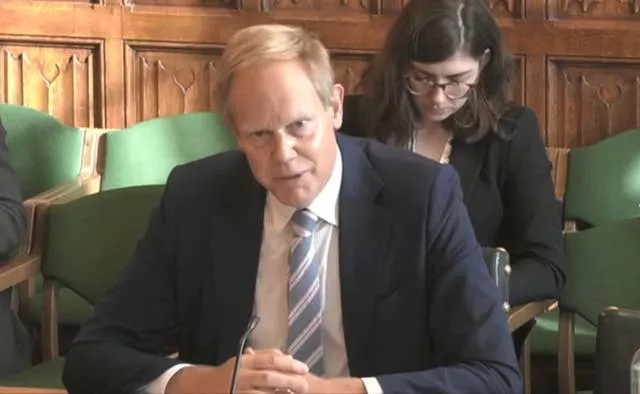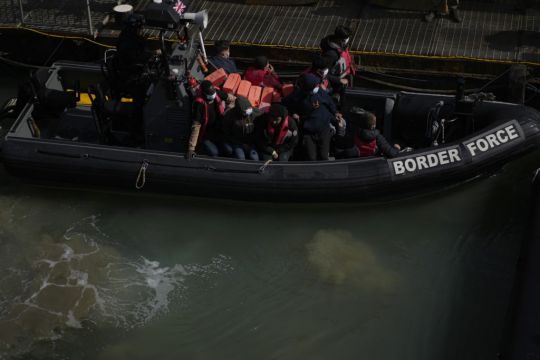The top civil servant in the British Home Office has said it is "impossible" to say how many people need to be sent to Rwanda to achieve the UK government’s aim of putting migrants off making dangerous Channel crossings.
Matthew Rycroft, the department’s permanent secretary, said the success of the controversial scheme should be measured by the number of journeys deterred by flying those deemed to have arrived in Britain illegally thousands of miles away to the east African nation.
But he was unable to quantify exactly how many would need to be deported for this disincentive to kick in.
Appearing before the Commons Home Affairs Committee, Mr Rycroft also said the details on how the government decides which migrants should be sent to an immigration removal centre and onwards to Rwanda need to be “retained in confidence”.
Asked what the screening process was designed to achieve, Mr Rycroft said: “The inadmissibility is about the method of arrival in the UK. So anyone arriving on a small boat or any other irregular entry is inadmissible. So that’s an easy judgment to make for an individual.
“Then the subsequent screening is essentially about safety of the individual.”
Put to him that not everybody who arrives in a small boat is being sent to Yarl’s Wood immigration removal centre and on to Rwanda, and asked if he is not allowed to share why some people are prioritised for this over others, he said: “Everyone who arrives that way is potentially eligible.”
Pressed on how it is then decided who is sent for removal, Mr Rycroft said: “I think that probably is an operational detail that needs to be retained in confidence.”
The top civil servant said it would “not be a victory” if more dangerous routes were taken as a result of the British Home Office policy.
“I do agree we should be thinking about irregular migration in general and all of the different routes, and it would be a pyrrhic victory if this set of policies were successful in closing down the small boat route, but created something even more dangerous,” he said.
But he said he had not seen further evidence of migrants attempting to cross into Britain via roundabout routes since the announcement of the Rwanda policy.
Asked if there was evidence already that people were attempting longer crossings, he said: “I think there was evidence through the course of last year that the people smugglers were attempting to evade the activity of French law enforcement by starting the sea bit of the journey off a wider range of beaches in northern France.
“I think there was some evidence of that last year.
“I haven’t myself seen any evidence of changes of behaviour in that particularity since the prime minister’s announcement on April 15th.”
Asked to quantify how many people need to be removed to the east African nation, in Home Office thinking, for its scheme to be successful, he said: “Well, I don’t think there’s a single answer to that question and obviously different people have different views about success.”
He said the department had done “a lot of modelling” on the number that would need to be sent away before the disincentive kicks in.
Pressed on whether it would be hundreds a year, or thousands, or tens of thousands, he said: “I don’t think at this stage it’d be right to speculate about those sorts of numbers.”
He said: “The one thing I would say is I don’t think the success of this scheme should be measured by the number of people being relocated to Rwanda. The success of the scheme should be measured by the number of journeys deterred.”
Asked again how many need to be removed before that disincentive will work, he said: “That is impossible to answer.”
Mr Rycroft told the committee that the views of civil servants are “irrelevant” when it comes to policies they may not personally agree with.
“The short version, of my view, is that the role of civil servants is maximum challenge of a policy before ministers decide it, in order to stress test it and make sure it is really robust,” he said.

“And then maximum support and implementation for that policy after ministers have decided it, provided it is legal.
“Now, it is irrelevant whatever any civil servant thinks about a policy, if the government of the day has determined that policy.”
He said that civil servants are “here to serve the government of the day, that is duly elected”.
“Now, if there are policies which people themselves feel or think are illegal, then that is a grey area,” he added.
Meanwhile, Mr Rycroft found himself in hot water for saying there is nothing the Home Office “loves better than a good crisis”.
He apologised if the remark was “overly flippant”, but insisted the department “does respond very well to a crisis”.
Asked if he could give examples of crises that had ended well in the department under his tenure, he said: “First of all, apologies if that was an overly flippant form of words. What I was getting at was that the culture in the Home Office, I think, does respond very well to a crisis.

“We’ve already just talked about Afghanistan and Ukraine. I think those are both crises the Home Office contribution to which has been something that I for one have been very proud of and I hope that everyone involved in it has been proud too.”
Challenged on whether the Afghan and Ukrainian crises had ended well, he said: “They haven’t ended well for either Afghanistan or for Ukraine.
“But they are continuing to go well in terms of the Home Office contribution to resettling 13,000 Afghans, and so far 120,000-plus Ukrainians, so I think that is a positive contribution by the Home Office.”







